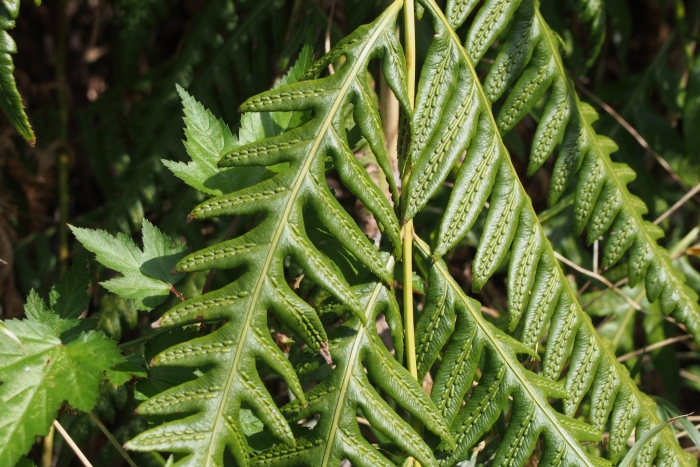Oriental Chain Fern
(Woodwardia orientalis)
Oriental Chain Fern (Woodwardia orientalis)
/
/

harum.koh
CC BY-SA 4.0
Image By:
harum.koh
Recorded By:
Copyright:
CC BY-SA 4.0
Copyright Notice:
Photo by: harum.koh | License Type: CC BY-SA 4.0 | License URL: http://creativecommons.org/licenses/by-sa/4.0/ | Rights Holder: harum.koh | Publisher: iNaturalist | Date Created: 2016-04-16T14:06:59-07:00 |























Estimated Native Range
Summary
Woodwardia orientalis, commonly known as Oriental Chain Fern, is an evergreen fern in warmer climates but may be semi-deciduous in cooler regions. It is native to the shaded, moist, and humid forest floors of Southeast Asia, including regions of China, Japan, and Taiwan. This species typically reaches a height and width of 4-6 feet (1.2-1.8 meters), with large, arching fronds that create a dramatic, tropical appearance. The fronds are bright green with a distinctive chain-like pattern of sori on the undersides, which are reproductive structures containing spores.
Oriental Chain Fern is valued for its lush foliage and the tropical ambiance it brings to garden settings. It is used in shaded garden areas, woodland plantings, and as a bold accent in moist areas of the landscape. In cultivation, it prefers partial to full shade, consistent moisture, and well-draining, humus-rich soil. While it can tolerate medium light, the fronds may scorch in full sun, especially in hotter climates. It is relatively low maintenance but may require additional water during dry periods. This fern is not known for significant pest or disease issues, but root rot can occur in poorly drained soils. It is not typically invasive when grown outside its native range, but gardeners should always monitor and manage their plants responsibly to prevent unwanted spread.CC BY-SA 4.0
Oriental Chain Fern is valued for its lush foliage and the tropical ambiance it brings to garden settings. It is used in shaded garden areas, woodland plantings, and as a bold accent in moist areas of the landscape. In cultivation, it prefers partial to full shade, consistent moisture, and well-draining, humus-rich soil. While it can tolerate medium light, the fronds may scorch in full sun, especially in hotter climates. It is relatively low maintenance but may require additional water during dry periods. This fern is not known for significant pest or disease issues, but root rot can occur in poorly drained soils. It is not typically invasive when grown outside its native range, but gardeners should always monitor and manage their plants responsibly to prevent unwanted spread.CC BY-SA 4.0
Plant Description
- Plant Type: Fern
- Height: 4-6 feet
- Width: 4-6 feet
- Growth Rate: Moderate
- Flower Color: N/A
- Flowering Season: Non-Flowering
- Leaf Retention: Evergreen, Semi-Deciduous
Growth Requirements
- Sun: Part Shade, Full Shade
- Water: Medium
- Drainage: Medium
Common Uses
Bank Stabilization, Deer Resistant, Low Maintenance, Potted Plant, Rabbit Resistant
Natural Habitat
Shaded, moist, and humid forest floors of Southeast Asia
Other Names
Common Names:
Scientific Names: , Woodwardia orientalis, Woodwardia radicans subsp. orientalis, Woodwardia radicans var. orientalis,
GBIF Accepted Name: Woodwardia orientalis Sw.